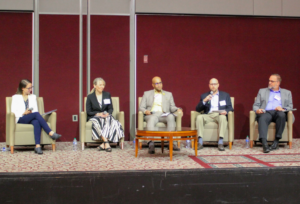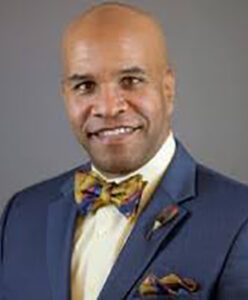The Relationship of Environmental, Social and Governance to Clean Energy Today

The environmental, social and governance, or ESG, movement has shifted the goals of corporations across the globe to include a more holistic approach including environmental, social and corporate governance concerns. This ESG criteria has been adopted throughout the United States financial industry as a way to measure a corporation’s sustainability and societal impact alongside financial factors.
 ESG goals help corporations go beyond simply maximizing their profit, explained Erik Lensch, Chief Executive Officer and Founder of Leyline Renewable Capital, LLC. Lensch joined a diverse panel of energy professionals for the keynote plenary “The Relationship of Environmental, Social and Governance (ESG) to Clean Energy Today” at the 2022 State Energy Conference of North Carolina.
ESG goals help corporations go beyond simply maximizing their profit, explained Erik Lensch, Chief Executive Officer and Founder of Leyline Renewable Capital, LLC. Lensch joined a diverse panel of energy professionals for the keynote plenary “The Relationship of Environmental, Social and Governance (ESG) to Clean Energy Today” at the 2022 State Energy Conference of North Carolina.
 Moderated by Deb Wojcik, Executive Director of the Research Triangle CleanTech Cluster, the panel also featured Michal Shepard, Director of Maintenance, Energy and Engineering, Harris Teeter; Ron Wages, Director, Diversity and Inclusion, Duke Energy Corporation; and Maurie Lawrence, Vice President Sustainability, Associate General Counsel, Milliken and Company.
Moderated by Deb Wojcik, Executive Director of the Research Triangle CleanTech Cluster, the panel also featured Michal Shepard, Director of Maintenance, Energy and Engineering, Harris Teeter; Ron Wages, Director, Diversity and Inclusion, Duke Energy Corporation; and Maurie Lawrence, Vice President Sustainability, Associate General Counsel, Milliken and Company.
As part of the environmental aspect of ESG, companies are rated on their impact on the environment- from carbon emissions to materials and energy consumption during manufacturing processes. Being a cleantech finance business, Leyline Renewable is committed to “fight climate change by providing flexible capital solutions to accelerate the deployment of renewable energy.”

The social concerns of ESG align company goals with the diversity, equity and inclusion movement. Lensch described how Leyline Renewable uses diversity, equity and inclusion to guide their investments both internally and externally. “We’re being proactive in how we’re investing capital by, for example, looking for projects that support low-income housing communities, or that can support developers run by minority or women-owned companies,” said Lensch.
 For the manufacturing company Miliken, safety concerns are also a major part of ESG. Maurie Lawrence described the threats climate change poses to resiliency, jobs and the supply chain. “At Miliken, it starts with people,” Lawrence said, “We want to have a positive impact on the planet and – we view it as an ‘and’- it’s not separate from profit.”
For the manufacturing company Miliken, safety concerns are also a major part of ESG. Maurie Lawrence described the threats climate change poses to resiliency, jobs and the supply chain. “At Miliken, it starts with people,” Lawrence said, “We want to have a positive impact on the planet and – we view it as an ‘and’- it’s not separate from profit.”
 Michal Shepard echoed Lawrence’s emphasis on safety, and discussed how ESG can help better people’s lives. “It’s about thriving together as a group,” said Shepard. Shepard clarified that many ESG goals can be aspirational, but they also must be operational for the company and the community. At Harris Teeter, they know skilled workers are key to creating a safe workspace so Shepard decided to start an apprenticeship program to support local skilled labor.
Michal Shepard echoed Lawrence’s emphasis on safety, and discussed how ESG can help better people’s lives. “It’s about thriving together as a group,” said Shepard. Shepard clarified that many ESG goals can be aspirational, but they also must be operational for the company and the community. At Harris Teeter, they know skilled workers are key to creating a safe workspace so Shepard decided to start an apprenticeship program to support local skilled labor.
 Ron Wages shared Duke Energy faces similar challenges to finding a well-informed workforce to expand renewable energy in North Carolina. In their most recent ESG report, Duke Energy’s social goals not only include safety and employee well-being, but also opportunities for employees to learn and develop to support the clean energy transition.
Ron Wages shared Duke Energy faces similar challenges to finding a well-informed workforce to expand renewable energy in North Carolina. In their most recent ESG report, Duke Energy’s social goals not only include safety and employee well-being, but also opportunities for employees to learn and develop to support the clean energy transition.
“Since 2010, we’ve retired 56 [coal facilities]- that’s 7500 MegaWatts,” Wages said. To make sure North Carolina has a just transition, however, Wages said, “As these new energy technologies and companies evolve, we will help bring them to North Carolina specifically in the areas that may lose some jobs or lose function so that we actually do great things and don’t have unintended consequences.”
ESG calls on every corporation to evaluate more than just their tangible assets and dig deeper to see the environmental and societal impacts they have. These intangible assets comprise an increasing percentage of future enterprise value to show how companies are working today to create a better tomorrow.